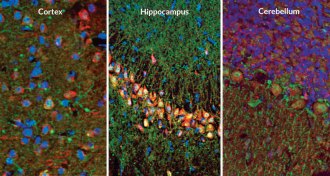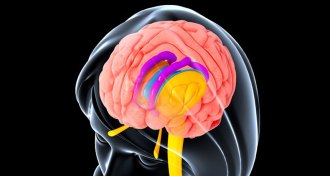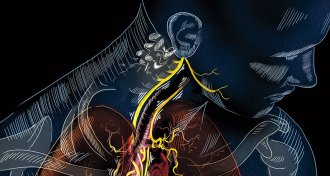Neuroscience
-
 Neuroscience
NeuroscienceYear in review: Gaps in brain nets might store memories
Holes in nets that surround nerve cells may store long-term memories, scientists proposed this year.
-
 Neuroscience
NeuroscienceBrain shapes come from mom and dad
By linking genes to brain shapes, scientists have a new way to study how the brain works.
-
 Neuroscience
NeuroscienceBusy eyes can make ears go temporarily deaf
When challenged with a tough visual task, people are less likely to perceive a tone, suggesting that perceptual overload can jump between senses.
-
 Neuroscience
NeuroscienceEyes hard at work can make ears go temporarily deaf
When challenged with a tough visual task, people are less likely to perceive a tone, suggesting that perceptual overload can jump between senses.
-
 Health & Medicine
Health & MedicineHigh-potency pot smokers show brain-fiber damage
People who smoke potent pot had signs of damage in a brain communication link.
-
 Health & Medicine
Health & MedicinePregnancy hormone could keep multiple sclerosis at bay
A small trial hints that pregnancy hormone can reduce MS flare-ups.
-
 Neuroscience
NeuroscienceTaste is all in your head
By targeting certain nerve cells in a mouse’s brain, scientists made plain water turn bitter or sweet.
-
 Science & Society
Science & SocietyThe vagus is the nerve to know
The nervous system's meandering superhighway has the potential to lead researchers treatments for myriad health conditions.
By Eva Emerson -
 Health & Medicine
Health & MedicineWhen selenium is scarce, brain battles testes for it
In competition for selenium, testes draw the nutrient away from the brain.
-
 Psychology
PsychologyCaffeine gives cocaine an addictive boost
Not only is it popular to “cut” cocaine with caffeine, the combination might be more addictive.
-
 Neuroscience
NeuroscienceViva vagus: Wandering nerve could lead to range of therapies
Researchers are testing ways to stimulate the vagus nerve to treat a slew of ailments.
-
 Health & Medicine
Health & MedicineAntibodies to fight Alzheimer’s may have unexpected consequences
Alzheimer’s-targeted antibodies make neurons misbehave even more, a study of mice shows.